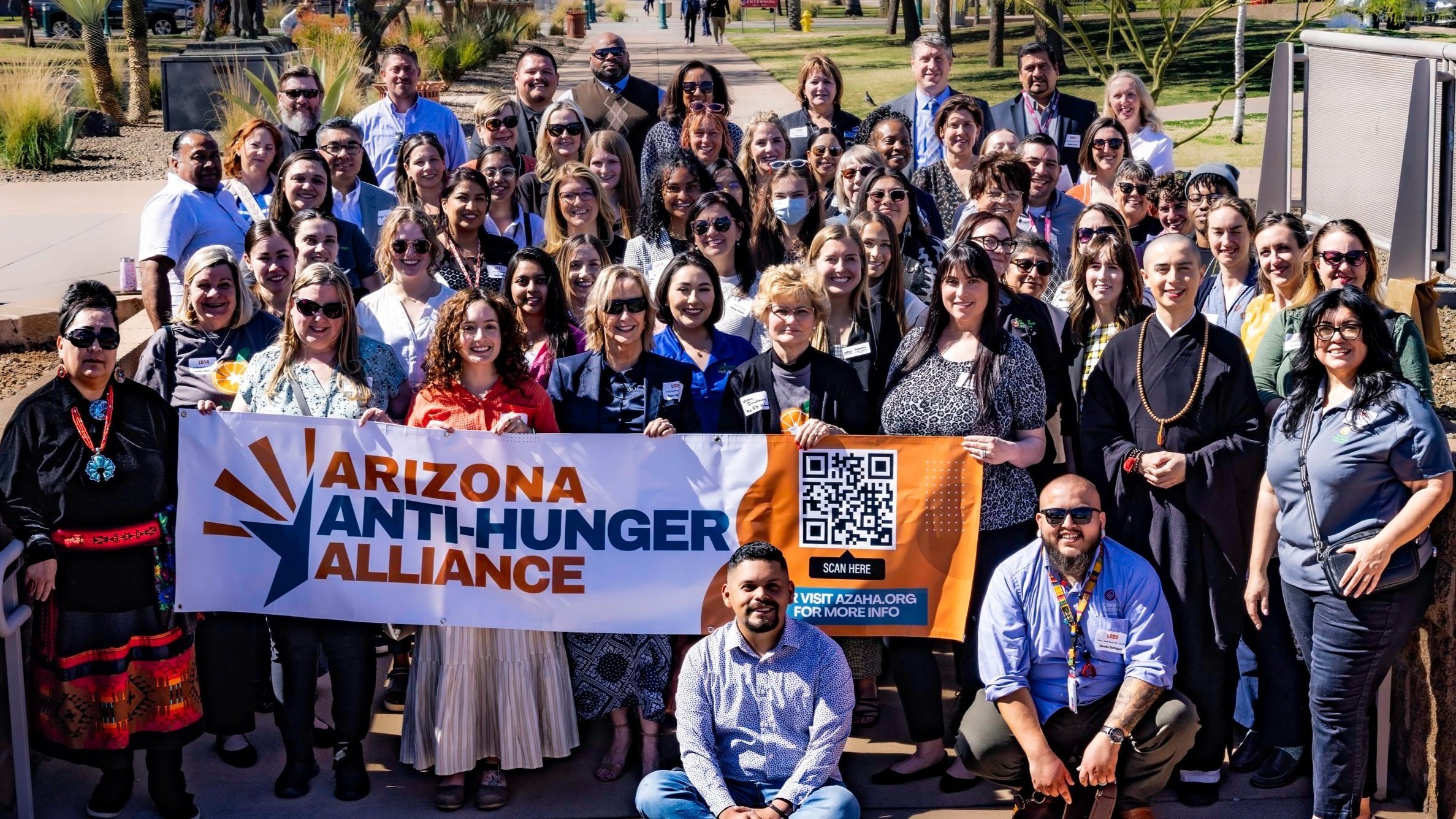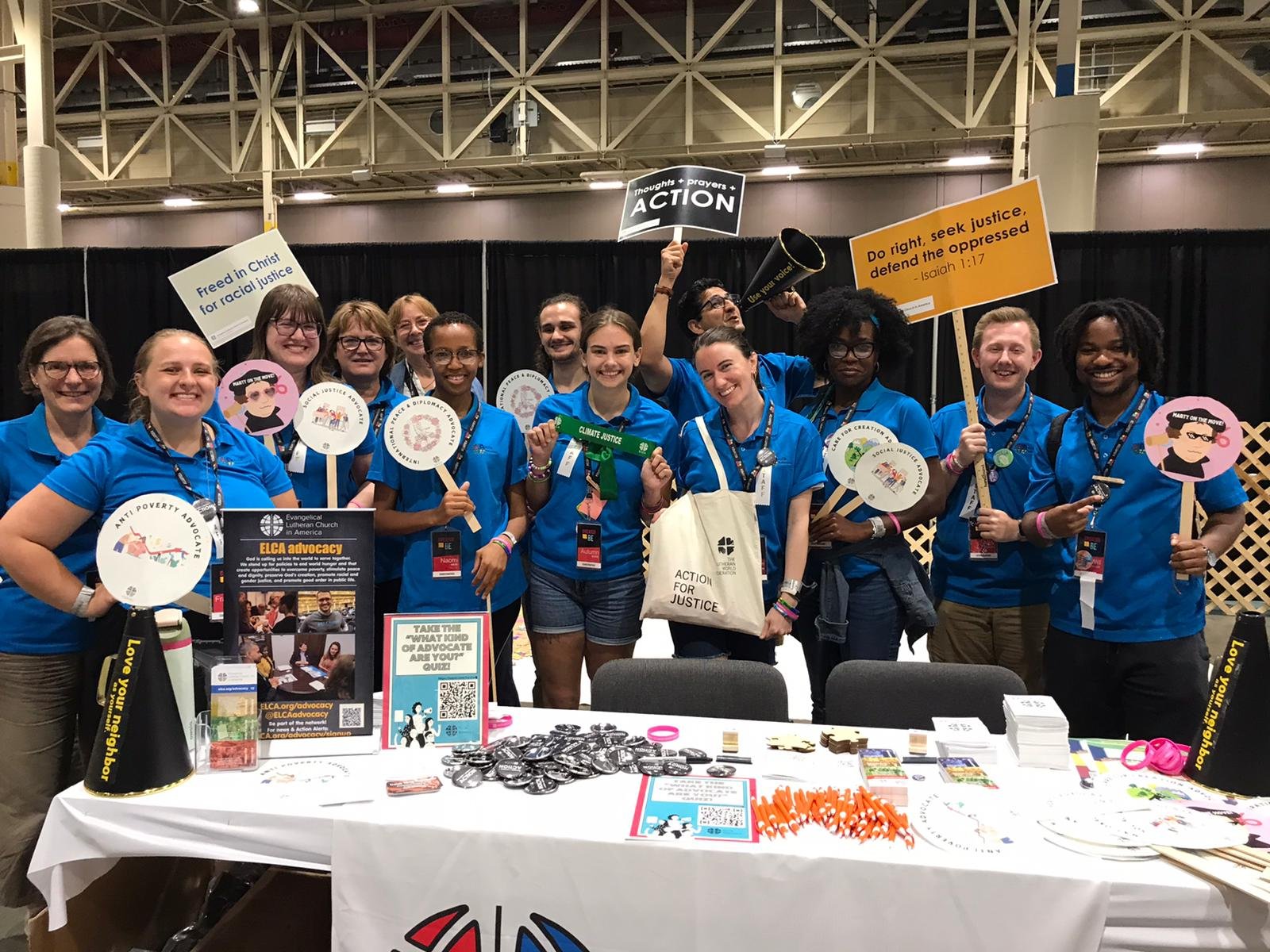Hunger Advocacy Fellowship: Autumn’s Year in Review
Well, my friends, we all of a sudden find ourselves at the end of my year with LAMA.
ELCA World Hunger sponsored this one-year advocacy fellowship here in my home state as part of its Hunger Advocacy Fellowship program. This fellowship is one of the many ways ELCA World Hunger works to combat hunger and its root causes. Over the last year, I have learned, experienced, and tried so many different things, and I have gotten to know both the world of advocacy and the church I hold so dear much more intimately.
I started my fellowship in September of 2023, with this blog post introducing myself to all of you!
2023-24 Hunger Advocacy Fellows at Spirit in the Desert
We hit the ground running, immediately beginning planning for the State Public Policy Office retreat, which hosted ELCA Advocacy staff from around the country at the Spirit in the Desert Retreat Center. This retreat was a great way to get to know the structure of the ELCA Advocacy team, which witnesses to many different expressions of our shared faith. I was and am delighted to get to work with people who share my religious values and care deeply about using public policy to serve our neighbors. As soon as that retreat was done, we jumped into the LAMA Policy Council Retreat, where I got to present a pitch for one of our policy priorities and vote on what LAMA would tackle this year. After that, it was straight into planning for Lutheran Day at the Legislature.
I was surprised, during these first few months, just how much event planning went into advocacy work— I often wondered if setting agendas and schedules was the best use of our time, but I’ve come to learn that advocacy and community organizing is more than just talking to lawmakers or even breaking down policy and equipping our community members to understand and act on the legislative process. Part of our job is also to bring people to the table itself. Events like Lutheran Day at the Legislature help people who wouldn’t otherwise engage in advocacy for the first time to do so. That wouldn’t be possible without the many hours and emails spent in the planning.
2024 Lutheran Day at the Legislature
“I have been told, more than once now, that people are inspired to see me, a young person, so passionate about the future of the church, and political issues, and social concerns, but I have found it just as hopeful to learn from the people who have already spent years working to make our world better. Leaders like our synod staff showed me that my care is not just a product of youthful passion, but that this work matters deeply.”
Grand Canyon Synod Staff
During this time, I also got to know Bishop Deborah Hutterer and the rest of the Grand Canyon Synod Staff. I consider us to be so, incredibly lucky to have a synod staff that is so supportive of and personally interested in advocacy. All of the pastors and lay people working in the Bishop’s office championed every event we held and project we undertook. What is more, they also became great personal supports. I know that it is rare to find work environments where everyone genuinely wants to see the best professional and personal outcomes for each other, and it was wonderful to experience. This fellowship was my first real, 9 to 5, professional job, and I truly felt that everyone I worked with at the synod took me under their wings. I have been told, more than once now, that people are inspired to see me, a young person, so passionate about the future of the church, and political issues, and social concerns, but I have found it just as hopeful to learn from the people who have already spent years working to make our world better. Leaders like our synod staff showed me that my care is not just a product of youthful passion, but that this work matters deeply. Sometimes it can feel like my generation is fighting an uphill battle, and it is emboldening to be assured that we are not the first to want to see a just world, nor are we working toward it on our own.
Even though I have long been an involved church member, I didn’t know very much about how the synod operated prior to this fellowship. I have been able to learn so many fascinating things about what the synod does inside and out of our congregations, and I got to make connections with and between so many wonderful and impressive people.
With the start of Arizona’s legislative session in January, a whole new set of opportunities opened up for me. For the first time in my life, I was paid to dig through the endless pages of pre-filed bills and early legislation to see what we would be tracking and championing, instead of trying to do this type of research in my off-time. I learned things that even I, as an involved voter, hadn’t been taught about, like the Request to Speak system and the process for scheduling meetings with lawmakers.
Arizona Anti-Hunger Alliance Advocacy Day
I also got to know and work closely with our partner organizations, like Arizona Faith Network and the Arizona Food Bank Network. These organizations are deeply knowledgeable about the issues they advocate on, and their mentorship taught me so much. I was able to learn granular details about hunger, school meals, food banking, and so on, down to the nitty-gritty statistics, because of their years of work and broad organizational reaches. This means that I was able to understand some bigger-picture realities of issues that I have cared about for a long time, as well as share what I learned with our own networks and community members. The women who run the Arizona Food Bank Network also possessed a wealth of knowledge and experience navigating the legislature, which I, as a young adult fresh out of college, did not know how to do.
One of the high points of this year was when I joined many of our partners at a Senate Health and Human Service Committee hearing and testified against a dangerous bill aiming to curtail SNAP participation. It was a powerful experience to take our shared concern to our lawmakers and bear a very public witness to our commitments to love, mercy, and justice.
Testifying to the Senate Health and Human Services Committee
“This moment left me incredibly proud, both of my own work, and that LAMA had been able to help an Arizona Lutheran make such a poignant public statement.”
At the Senate with AFN
I also joined AFN in observing the senate’s vote on HCR 2060, which sought to make illegal immigration a state crime. Many faith leaders sat in the gallery to demonstrate our many objections to this dehumanizing bill. To my surprise, Senator Anna Hernandez (LD-24) read a letter from a constituent while explaining her vote. This constituent identified himself as an ELCA Lutheran and voiced the many reasons we, as people of faith, objected to this bill and its rhetoric. Many of the points he made came directly from our action alerts and legislative updates, including the policy details I was able to break down on our blog. This moment left me incredibly proud, both of my own work, and that LAMA had been able to help an Arizona Lutheran make such a poignant public statement.
Visiting the Grand Canyon Food Pantry
Over this year, Solveig and I also spent countless hours working with you, our community. We visited many congregations, where we were able to share our ministry and mission. We spent hours on zoom meetings explaining policy details and helping coordinate projects. We did our best to uplift our congregations’ work and celebrate your service to your communities. Some of my favorite memories and lessons come from this summer, as I visited ministries around the state.
I think it is incredibly important that ELCA Advocacy serves as a tool to congregations, not just a siloed ministry dedicated to lobbying our lawmakers. I don’t think there is a point to advocating for and with the Church unless we are reflecting the real concerns and priorities of the people in our pews. I am grateful that so many ministries were not only willing but ready to open their doors to me. Political engagement can be very scary for churches and ministries, and yet so many of you trusted me enough to teach me about your work, your neighbors, and your experiences so that I could work on your behalf.
Travelling to the ELCA Youth Gathering with the rest of the Advocacy team was yet another high point. I have loved getting to work for the church and learn from both rostered leaders and people working in ministries that live outside of any one congregation. I continue to marvel at how open our Church remains; I have spoken to people across the churchwide structure, and every one of them has been ready to answer questions, point me in helpful directions, or assist with our projects.
Witness in Society (Advocacy) team
This fellowship has allowed me to engage with and develop my theology in a way that no other advocacy job could. For me, my political stances, legislative passion, and community concerns have always been born directly from my faith. Theology isn’t something that justifies the way I feel about our world, but instead teaches me how to engage with the world around me in a way that offers dignity to all people. It is not lost on me how special it has been to be able to place those theological convictions front and center when engaging with policy.
When I first applied for this fellowship, my interest was piqued because I have long held a passion for making advocacy and civic engagement accessible. Throughout my adolescence and young adulthood, I have been surrounded by peers who have cared very deeply about their communities and policies that shape these communities, but had not been given the tools to engage with the process. Legislation can be difficult to understand, especially if one is trying to figure out its long-term effects. Figuring out the best candidates to vote for is difficult if you don’t know where to look for information. Even knowing how to vote is difficult to figure out if no one is teaching you. I had spent a lot of free time in past years researching and explaining ballot measures and the voting process to people I care about, and I was interested in this job because it sounded like it would allow me to help more people learn how to advocate and to learn about issues along with them. And it has.
I am so grateful for the accompaniment this fellowship has fostered. I continue to daily learn with and from the relationships I have built during the last year. It has brought me so much joy to work with your congregations, ministries, and projects. I am so very blessed to be able to offer my knowledge and experience to people and endeavors that will use what I know to do important things.
This won’t be the last you hear from me, I promise. As a Hunger Leader at my own congregation, as a Lutheran, and as an advocate, I’m just getting started. It’s only a matter of time before I will be back supporting LAMA or calling upon you all for projects of my own.
In Christ’s radical, transformative, disruptive love,
Autumn








